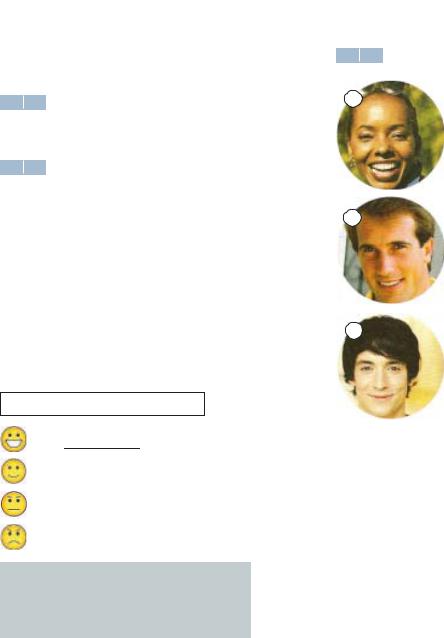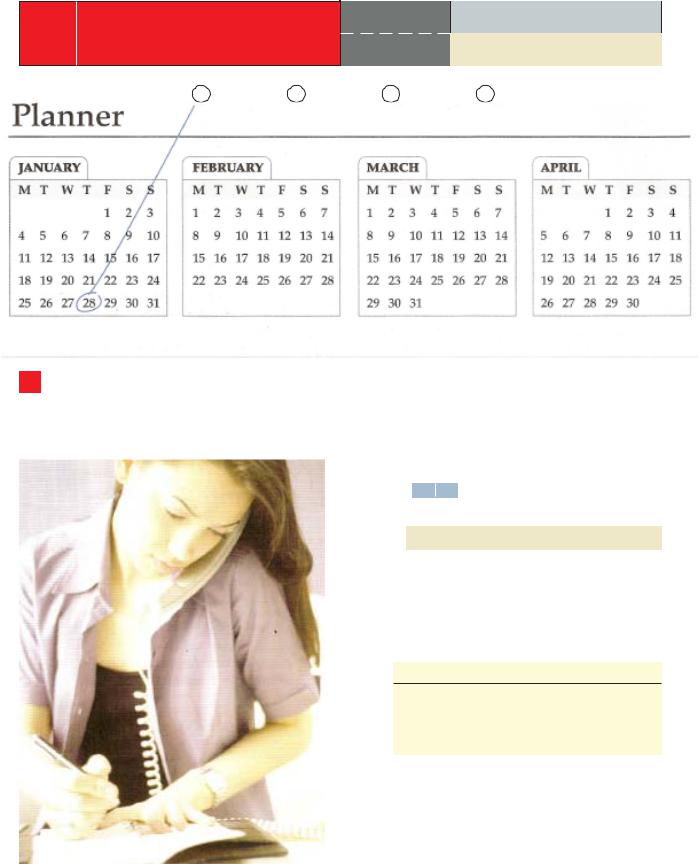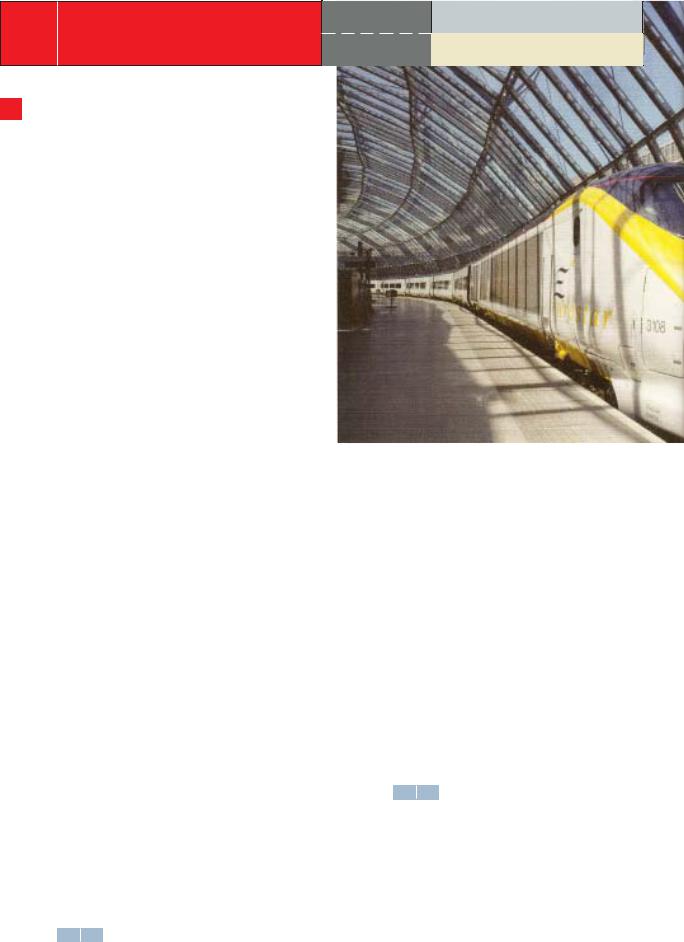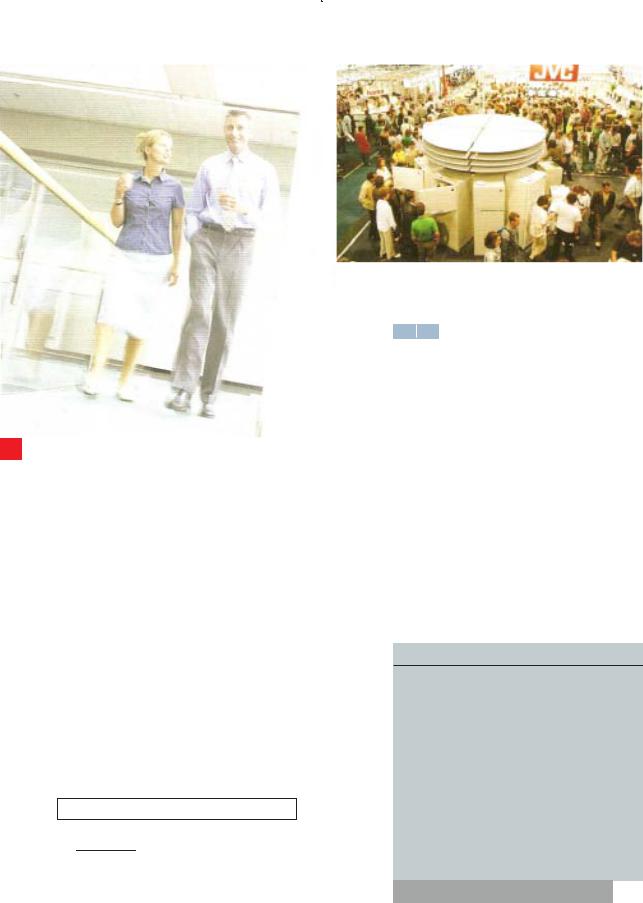
Business Start-up 1 Students Book
.pdf
|
d |
71 |
PRONUNCIATION Check your |
|
|
answers. Listen and repeat. Are any of |
|
|
|
the words the same or similar in |
|
|
|
Portuguese? Is their pronunciation |
|
|
|
different in English? |
|
|
|
|
|
2 |
a |
72 |
Listen to two colleagues |
|
|
talking about leisure. Which activities |
|
|
|
from 1c do they talk about? |
|
|
b |
72 |
Listen again. Complete this |
extract from the conversation.
ADon’t you like 1 __________ ?
BI hate 2 __________ .
AOh, I love 3 __________ . It’s good for you, as well.
BNot if you can’t 4 __________ !
A No, that’s true!
cFill in the gaps. Then make four sentences that are true for you.
like don’t like love hate
eLook at the photos. Can you guess what the people do in their spare time?
f |
73 Now listen to the people and |
fill in the gaps. |
|
1 |
1 I play __________ . |
|
I do __________ . |
|
I go __________ . |
2 2 I play __________ . I do __________ . I go __________ .
3 3 I play __________ . I play the _______ . I go __________ .
1 |
I |
love |
skiing! |
|
|
|
|
|
|
|
go / play / do |
||||
|
|
|
|
|
|
|
|
2 |
I __________ walking. |
|
|
|
I go + nouns with -ing |
||
3 |
I __________ swimming. |
|
|
|
I play + sports, games, musical |
||
|
|
|
instruments |
||||
|
|
|
|
|
|
|
|
4 |
I __________ running. |
|
|
|
I do + aerobics, weight training |
||
|
|
|
|
|
|
|
|
Gerund |
|
|
|
|
|
g Vocabulary practice F Page 99, Exercise 6. |
|
I hate walking. |
|
|
|
|
|||
|
|
3 |
|
Communication practice 18 F Page 82. Work |
|||
I like skiing. |
|
|
|
|
|
with a partner. |
|
|
|
|
|
|
|
||
|
|
|
USEFUL LANGUAGE |
|
|
F Grammar reference 19 |
|
||
d |
|
What do you do in your spare time? |
||
Grammar practice F Page 99, Exercise 5. |
||||
I go cycling. |
||||
|
|
|
||
|
|
|
I do aerobics. |
|
|
|
|
I play football/the guitar. |
|
|
|
|
I love/like/hate swimming. |
|
|
|
|
|
|
41

7 Meeting
7.1Arranging to meet
GRAMMAR Prepositions with times and dates
VOCABULARY Months days
1 |
2 |
3 |
4 |
1 |
a |
|
Listen to four short |
|
|
|
|||
74 |
|
conversations. When do the people arrange to meet? Mark the four dates on the calendar
b |
|
75 |
|
Listen and repeat the months. |
|||||||
|
January |
February |
March |
April |
|||||||
|
|
May |
June |
July August |
|
|
|||||
|
|
September |
October |
|
November |
||||||
|
|
December |
|
|
|
|
|
|
|||
c |
75 |
|
PRONUNCIATION Listen again |
||||||||
|
|
and fill in the chart. |
|
|
|
|
|||||
|
|
|
|
|
|
|
|
|
|
|
|
|
|
oOo |
|
O |
|
Ooo |
|
Oo |
|
oO |
|
|
|
|
|
|
|
|
January |
|
|
|
|
|
|
|
|
|
|
|
|
|
|
|
|
|
|
|
|
|
|
|
|
|
|
|
|
|
|
|
|
|
|
|
|
|
|
|
|
Dates
We write: |
We say: |
May 11th |
May the eleventh |
11th May |
the eleventh of May |
42

d Vocabulary practice F Page 100, Exercise 1.
e |
|
76 |
Listen. Write the days in the |
|||
|
order you hear them. |
|
||||
|
|
|
|
|
||
|
|
Monday |
Tuesday |
Wednesday |
||
|
|
Thursday |
Friday |
Saturday Sunday |
||
1 |
Wednesday |
5 |
__________ |
|||
__________ |
||||||
2 |
__________ |
6 |
__________ |
|||
3 |
__________ |
7 |
__________ |
|||
4 |
__________ |
|
|
|||
|
|
Listen and repeat. Practice |
||||
f |
|
77 |
||||
saying the days of the week.
gWork with a partner. Look at the calendar. You say a date and your partner says the day. Change roles.
A The twelfth of January. B Tuesday.
2 |
a |
74 Listen to the conversations in |
|
|
1a again. Fill in the gaps in the |
||
|
sentences with at, in, or on. |
||
|
1 |
I’m free at |
the end of January. |
|
|
Yes, I can make it _____ the twenty- |
|
|
|
eighth. |
|
|
2 |
I’m free _____ |
February. |
|
|
I’m busy _____ the beginning of |
|
|
|
February. |
|
|
3 |
Are you free _____ the middle of |
|
|
|
March? |
|
|
|
No, I can’t make it _____ Friday. |
|
|
4 |
_____ the morning? |
|
|
|
_____ nine o’clock? |
|
Prepositions with times and dates
on |
Tuesday |
|
July 9th (dates) |
in |
March (months) |
|
summer (seasons) |
|
the middle of ... |
|
the morning/afternoon/evening |
at |
ten o’clock (times) |
|
the beginning/end of ... |
|
night |
|
the weekend |
|
Christmas |
F Grammar reference 13
bGrammar practice F Page 100, Exercise 2.
cVocabulary practice F Page 100, Exercise 3.
dWork with a partner. Student A points
to one of the phrases and Student B asks a question. Take it in turns.
AFriday.
BAre you free on Friday?
|
• |
Tuesday |
|
|
• |
end of March |
|
|
• |
the morning |
|
|
• |
six o’clock |
|
|
• |
Friday |
|
|
• |
two o’clock |
|
|
• |
middle of December |
|
|
• |
August 10th |
|
|
• |
the weekend |
|
|
• |
the evening |
|
3 |
|
|
PRONUNCIATION Listen and |
|
78 |
||
|
repeat. How do you say -th at the end |
||
|
of numbers? |
||
1 |
What about the twenty-eighth? |
||
2 |
I’m free on the fourth of February. |
||
3 |
Friday the twelfth? |
||
4 |
Yes, the seventeenth of May id fine. |
||
5 |
No, I can’t make it on Friday the |
||
|
|
thirteenth. |
|
6 |
So, Monday the fifteenth. |
||
4Communication practice 19. Student A F Page 82. Student B F Page 90.
USEFUL LANGUAGE
When can we meet?
When are you free?
What about the tenth of June?
That’s fine.
No, I’m busy on the tenth.
I can/can’t make it at the end of June.
I’m free at the beginning of July.
I’m busy in the middle of July.
What about the first week in August?
43

|
Discussing future |
GRAMMAR |
Present continuous: future |
|
7.2 |
arrangements Who ...? Why ...? |
|||
arrangements |
VOCABULARY |
Travel language |
||
|
||||
|
|
|
|
1 |
a |
79 |
Listen to Gary Lipton talking to |
|
|
|
a colleague about his plans for a |
||
|
|
business trip. Fill in the gaps in his |
||
|
|
diary. |
|
|
|
|
|
|
|
|
|
Paris |
London Chicago London |
|
bRead Gary’s diary again and answer the questions.
1Is Gary leaving LA on Tuesday?
2Where’s he changing flights on the way to London?
3Is he taking the train to Paris on Wednesday?
4In Paris, which hotel is he staying at?
5Is he coming back to London on Saturday?
6Is he arriving in Chicago in the morning?
cIn the sentences Gary Lipton describes his travel plans. Fill in the gaps.
take |
arrive |
change come back |
|
leave |
stay |
|
|
|
|
|
|
1 I ’m leaving |
Los Angeles on Monday. |
||
2I __________ the train - the Eurostar.
3Then I __________ in Paris for three nights.
4I __________ back to London on the train.
5I __________ in LA in the middle of the night.
6Then, on the flight home, I __________
in Chicago.
44

Present Continuous: future arrangements
|
I’m flying to London on Monday. |
||
|
She’s meeting a colleague this |
||
|
afternoon. |
||
|
They’re arriving tomorrow. |
||
|
We’re having a meeting at four o’clock. |
||
|
|
||
|
F Grammar reference 20 |
|
|
d |
|
Listen again and check your |
|
79 |
|||
|
answers. |
||
eVocabulary practice F Page 100, Exercise 4.
fGrammar practice F Page 100, Exercise 5.
gCan you complete these questions
from Gary’s conversation in 1a?
How When Where Who Why
1 |
|
When |
||
__________ are you going to Europe, |
||||
|
|
Gary? Next week? |
||
2 |
__________ are you going? To the |
|||
|
|
London office? |
||
3 |
__________ are you meeting? Tanya |
|||
|
|
Dolan again? |
||
4 |
__________ are you going to Paris? |
|||
|
|
On business? |
||
5 |
__________ are you travelling to |
|||
|
|
Paris? Are you driving? |
||
h |
|
|
|
Look at the tapescript on page |
|
79 |
|
||
|
121 and listen to Gary’s conversation |
|||
|
again. Check your answers. |
|||
i |
80 |
|
PRONUNCIATION Listen and |
|
|
repeat. How do you say the underlined |
|||
|
words? |
|||
1 |
Who’s she meeting? |
|||
2 |
Who are you travelling with? |
|||
3 |
Who’s coming to the meeting? |
|||
4 |
Why are you leaving early? |
|||
5 |
Why’s he going to London? |
|||
6 |
Why are they staying in that hotel? |
|||
Who ... ? Why ... ?
Who are you working with?
I’m working with John.
Who’s going to the meeting?
Anne, Peter and Ken.
Why are you going to Hamburg?
I’m going to a meeting.
Why’s he taking the train?
Because he doesn’t like flying.
F Grammar reference 8
2Work with a partner. Look back at Gary’s diary. Ask and answer questions about his trip.
A When’s Gary leaving/arriving in ... ? B He’s leaving/arriving at ... .
AWhat’s he doing on ... ?
BHe’s flying/meeting/going... .
AWhere’s he ... ? / Who’s he ... ? / Why’s he ... ? / How’s he ... ?
3Communication practice 20. Student A F Page 82. Student B F Page 90.
4Talk to other students. Find out what
arrangements they have for this week.
USEFUL LANGUAGE
Where are you going?
Why are you going to Milan?
When/What time are you leaving?
Who are you meeting?
How are you travelling?
I’m leaving London on Tuesday.
I’m arriving/changing in Paris.
She’s staying for a week.
He’s flying.
They’re taking the train.
45

TIME OUT
7.3Buying train tickets
GRAMMAR would like to want to
VOCABULARY Train tickets and reservations
1a Talk to other students about train travel.
How often do you travel by train?
Do you like train travel?
Do you usually reserve a seat?
bGary Lipton is buying a ticket for the Eurostar. Read the conversation. Fill in the gaps.
|
Assistant |
Hello. |
|
Gary |
Hi. I’d like to book two seats to |
|
|
Paris, please. For tomorrow. |
|
Assistant |
At 1 ________ time? |
|
Gary |
At about 5.00 pm. I don’t have |
|
|
a timetable. |
|
Assistant |
2 ________ ‘s a train at 17.15. |
|
|
It 3 ________ in Paris at 20.55, |
|
|
local time. |
|
Gary |
Right. OK, 4 ________ ‘s fine. |
|
Assistant |
Would you like to travel first |
|
|
class or standard class? |
|
Gary |
Standard. |
|
Assistant |
And would you 5 ________ a |
|
|
single or a return ticket? |
|
Gary |
A round trip, please. |
|
Assistant |
When would you like to |
|
|
6 ________ back? |
|
Gary |
I want to return on Saturday, |
|
|
but I don’t know what |
|
|
7 ________ . |
|
Assistant |
Do you want to book the return |
|
|
trip now? |
|
Gary |
If I reserve a seat now, |
|
|
8 ________ I change the |
|
|
reservation? |
|
Assistant |
With a standard fare, you can |
|
|
change or cancel the booking, |
|
|
yes. |
|
Gary |
OK. How 9 ________ is the |
|
|
standard fare, then? |
|
Assistant |
One moment. |
c |
81 Listen and check your |
|
|
answers. |
|
dFill in 1 - 9 with words from the conversation in 1a.
1a one-way ticket (US) = a ________single (UK)
2a round-trip ticket (US) = a ________
(UK)
3a list of times (of trains) = a ________
4the time at the destination = ________
5to come back = to ________
6to book = to ________
7a booking = a ________
8a ticket price = ________
9normal (ticket, class) = ________
e |
82 Check your answers. Listen |
|
and repeat. |
f Vocabulary practice F Page 100, Exercise 6.
46

g |
|
83 |
PRONUNCIATION How do you |
|
say to in these sentences? |
||
1 |
I’d like to book a seat. |
||
2 |
When would you like to come back? |
||
3 |
I want to return on Saturday. |
||
4 |
Do you want to book the return trip |
||
|
|
now? |
|
want to + infinitive / would like to + infinitive
I’d like to book a seat.
I want to book a seat.
When would you like to leave?
When do you want to leave?
Note: would like to is more formal / polite then want to.
F Grammar reference 21
hGrammar vocabulary F Page 101, Exercise 7.
2 |
a |
84 Listen to this customer |
|
|
booking a train ticket. Complete the |
||
|
information (1 - 8) |
|
|
|
1 |
Destination: |
Birmingham |
|
____________ |
||
|
2 |
Ticket (single/return): |
____________ |
|
3 |
Leaving on (day): |
____________ |
|
4 |
Leaving at (time): |
____________ |
|
5 |
Returning on (day): |
____________ |
|
6 |
Returning at: (day) |
____________ |
|
7 |
Class:: |
____________ |
|
8 |
Fare: |
____________ |
bWork with a partner. Look at the tapescript for 2a on page 122 and practise the conversation.
3Communication practice 21. Student A F Page 82. Student B F Page 91.
USEFUL LANGUAGE
I’d like a return to (Birmingham), please. Would you like to book/reserve a seat? When do you want to leave / come back? Do you want to travel first class or second/standard/economy class?
How much is the standard fare?
Can I change my booking/reservation?
Tickets
a single ticket (UK) / a one-way ticket (US)
return ticket (UK) / round ticket (US)
47

8 Reporting
8.1 |
Talking about |
GRAMMAR |
be: past simple How many ...? |
|
past events |
VOCABULARY |
Time references to the past |
||
|
1 a |
85 |
Listen to Hanna Day talking to |
a colleague about a trade fair she visited in India. Underline the correct words.
1The trade fair was yesterday/last week.
2The trade fair was quite/very good.
3There were about 100/400 companies at the trade fair.
4Hanna was in Calcutta last year/two years ago.
5The trade fair in Calcutta was/wasn’t very big.
6Hanna and her colleagues were/ weren’t in the same hotel.
bCan you complete these questions from 1a? Fill in the gaps.
how was many were where
1Were you at the trade fair last week?
2________ was it? In Delhi?
3________ was it? OK?
4________ it big?
5How ________ companies were there?
c |
85 |
Listen again and check your |
|
answers. |
|
d |
86 |
PRONUNCIATION Listen and |
repeat. How do you say was(n’t) and were(n’t) in these sentences?
1 Were you at the trade fair?
/ /
2 Where was it?
/ /
3 It was big.
/ /
4 I wasn’t there last year.
/ /
5 There were thousands of people.
/ /
6 We weren’t in the same hotel.
/ /
be: past simple
Positive
The conference was good last week. They were in the same hotel.
Questions
How many people were there?
Was John there?
Negative
The big companies weren’t at the fair. The presentation wasn’t very good.
F Grammar reference 22
e Grammar practice F Page 101, Exercise 1.
48

f Work with a partner. Talk about where |
3 |
you were: |
|
•yesterday evening
•last Saturday
•a week ago
Time references to the past
Tuesday
March
last week/month/year summer Christmas
two days
three months ago a year
gVocabulary practice F Page 101, Exercise 2.
hMake sentences. Use the words in
brackets and past time expressions.
1 Today is Thursday. (Monday)
Monday was three days ago.
_______________________________
2It’s November. (October)
_______________________________
3This year. (2001)
_______________________________
4It’s Friday. (last Friday)
_______________________________
5Today is Thursday. (Wednesday)
_______________________________ 2
6This month. (May)
_______________________________
aCommunication practice 22. Student A F Page 83. Student B c 91.
Look again at your information from Communication practice 22. Write an email telling your boss about the conference/training course you went to. Use the email in exercise 2 to help you.
To: ...
From: ...
Subject: ...
Dear ... ,
USEFUL LANGUAGE
How was the trade fair last week? It was/wasn’t very good.
There were a lot of people there. There weren’t a lot of new products. Where was it?
Who was there?
Was the meeting long?
How many people were at the meeting?
Time references to the past yesterday, last Friday, last week, last month, last year, three days ago
Read this email from Hanna to her manager, Luke Roscoe. Fill in the gaps with correct form of be.
49

8.2Giving an update
GRAMMAR Past simple: regular verbs
VOCABULARY Business trips
1 |
a |
|
87 |
|
Listen to Martin Berg giving an |
|
|
update to his manager, Hanna Day, |
|
||||
|
about his business trip last week. Was |
|||||
|
it a good trip? |
|
||||
|
b |
87 |
|
Listen again. Are these |
|
|
|
sentences true (T) or false (F)? |
|
||||
|
1 |
Martin travelled to Mexico on |
F |
|||
|
|
|
Thursday. |
|
||
|
2 |
He worked all day on Friday. |
|
|||
|
3 |
He stayed in a hotel near the |
|
|||
|
|
|
office. |
|
||
|
4 |
Martin’s presentation started |
|
|||
|
|
|
at 9.00. |
|
||
|
5 |
The presentation finished at |
|
|||
|
|
|
9.30. |
|
|
|
|
6 |
This morning, Miguel phoned |
|
|||
|
|
|
Martin. |
|
||
50
c |
|
|
Listen again. Underline the |
|
87 |
||
|
|
|
|
|
correct words in these sentences |
||
|
about Martin. |
||
1 |
He presented/didn’t present the |
||
|
|
business plan. |
|
2 |
He talked about/didn’t talk about the |
||
|
|
cost of materials. |
|
3 |
He discussed/didn’t discuss suppliers |
||
|
|
with Miguel. |
|
4 |
He visited/didn’t visit the factory. |
||
5 |
He looked at/didn’t look at the new |
||
|
|
production line. |
|
d |
88 |
Listen and check your |
|
answers. Practise saying the sentences.
e Vocabulary practice F Page 101. Exercise 3.
